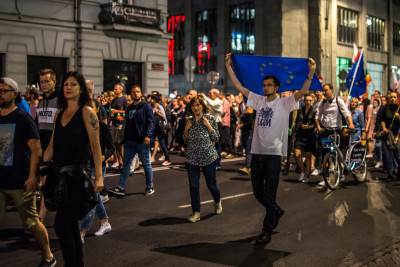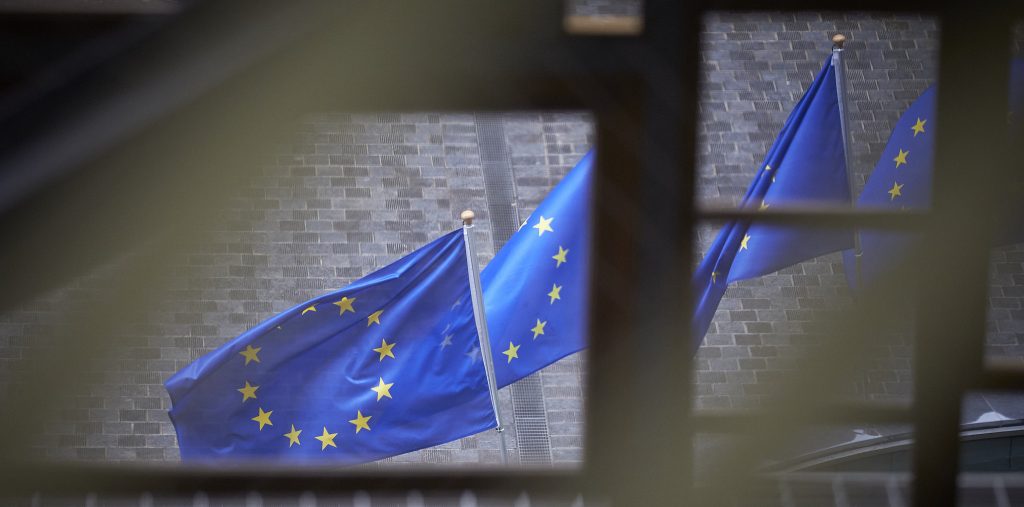The annual State of the Union Address of President of the European Commission Jean-Claude Juncker of September 13, 2017, was a good opportunity to reflect on the problem of democratic deficit in the European Union (EU). The usual problems discussed in the framework of democratic deficit basically refer to the question of legitimacy of the EU governance. They touch upon wide powers of the EU Council, the fact that the Council of Ministers that adopts laws consist of ministers who have not necessarily been elected on the national level, the fact that the EU president and the President of the European Commission are unelected officials, and the problem of a low voter turnout in European Parliament elections (42.61% in the 2014 elections). The latter is believed to be a result of the low level of acceptance of the EU by the European citizens.
The Gap
On the conceptual level, the challenges to the legitimacy of the EU governance are posed by the lack of representativeness of the EU citizens, the failure to make the EU more accessible, and insufficient accountability of the EU institutions. The problem of the “structural democratic deficit” within the EU has also been pointed out by many, including the German Constitutional Court.
In the past, some of these problems have been addressed. For example, the role of the European Parliament has been strengthened vis-à-vis the Council and new citizen participation tools have been added to the EU governance structures, such as the right to petition and more recent rights to European citizens’ initiative.
While formally these tools provide for exchange between the European institutions and European citizens, the gap between the values of some segments of European societies on the one hand, and the EU values reflected as such on the EU level seems to be widening. Examples of such would be: values enshrined in the EU treaties, the Charter of Fundamental Rights, and those in preambles of various directives, regulations and other sources of EU law (such as fundamental rights, non-discrimination, equality, transparency and similar).
Namely, it is becoming very obvious that there are portions of the European populations that do not seem to accept these values anymore. For instance, many people in Europe do not recognize universality of human rights of people who are not EU citizens, or even of citizens of other EU member states. Also, the right to free movement of EU citizens within the EU territory, which has been gaining recognition since the adoption of the Citizens Directive in 2004, is now losing importance due to accusations that EU citizens moving from new member states to the old member states are only “jobseekers”, “welfare shoppers”, and hence are undesirable.
Further, nationalistic and racist sentiments within the EU societies are gaining significant prominence. The openly racist party Golden Dawn has been sitting in the Greek parliament since 2012. In 2017, the German parliamentary elections brought a shocking success to Alternative for Germany (AfD), which aggressively defends racist, anti-immigrant, and anti-refugee positions; this means that such positions will be officially represented in the German parliament for the first time after the Second World War. While Marine Le Pen has been defeated at the presidential elections in France in 2017, her party, Front National, remains a strong political actor pursuing a comparably nationalistic programme. The situation is similar in various other EU member states (e.g. Austria, the Netherlands, Finland, Slovenia) where nationalistic politics is not the winning option yet, but it enjoys a strong support of the local population.
Yet, in other parts of Europe, most prominently in Poland and Hungary, similar, but slightly different adverse trends are on the rise. Along with strong anti-refugee sentiments, additional illiberal trends are notable. They aim towards closed societies governed by strong central authoritarian governments which are interested in leaving only limited room for democratic oversight and judicial control. These governments are heavily criticized by the EU institutions for their methods of governance, due to their impediments for democracy and the rule of law.
At the same time, the trust of the EU citizens in the EU institutions is on decline. According to the Standard Eurobarometer opinion poll of 2016, only one third (33%) of Europeans trust the European Union, which is an extremely low share. Now, the question is: what if we tried to bring the EU even closer to its citizens? How would the EU have to change in order for this to happen?
Identifying Identity
The fact is that we might not like the result. First of all, the often progressive-thinking EU institutions might not identify with what its citizens would like them to become. Further, EU citizens might not agree among themselves on how the EU should develop in the future. For instance, those that are more progressive already criticize the EU for not being sufficiently bold in proactively addressing migration challenges. They might also criticize the EU for its lack of action in cases of fundamental rights violations by the EU member states. Others criticize the EU for being too lenient towards migration, taking the risk of losing its “European identity”, whatever this might be. These voices demand even more closure of external and internal borders, more return, less immigration, and lower asylum recognition rates. Yet again, some want more democracy, transparency, and more accountability of the EU institutions. Others feel thatwhat the EU needs are leaders who are more decisive, have stronger personalities, and would represent father figures to the European nations.

staboslaw via Flickr || CC 4.0
Moreover, the West might want something completely different than the East. The already significant economic and political differences between the two poles also cause different expectations from both, the EU, as well as from other member states. Taking all these differences into account, it seems that Juncker’s plan (evident from the State of the Union Address of 2017) to further consolidate the EU, seems just right. In this process, reaffirmation of EU’s legitimacy and bringing it closer to the citizens would also be much needed. Consultations with citizens that Juncker (and before him French President Macron) mentioned on several occasions would be more than appropriate in this process. They have to take place not only nationally, but also shall be held locally. Not just in bigger cities, but also in towns and villages.
To put it simply, the EU is splitting into two universes – one consisting of societies profiting from EU membership, economic growth, scientific and technological development, and multicultural experiences offered by EU cities and another one composed of societies that are economically deprived, do not feel that their opinions are heard, and feel threatened by fast globalization and constant acceleration of mobility of people and information. It is not surprising that closing down into smaller circles, behind the seeming protection of the national borders, might seem as a good idea in these circumstances. Hence, new links between the two universes have to be established, and this has to be done both bottom-up and top-down.
While there is definitely the need for the societies to be aware of this problem and organize locally, there is also a need for the EU to know about these parallel universes and act accordingly. If these problems are not addressed, the gap between the two universes will widen. In such circumstances, further decomposition of the EU might become the real threat.
Two Universes
These issues are strongly visible in daily lives of Euroepans. In our work on issues such as fundamental rights, the rule of law, and migration, we meet groups that seem to be coming from a completely different place, as they might for instance care much more for religion, tradition, patriotism, or national identity. This is not a problem by itself. The problem will, however, emerge if the two universes have nothing in common anymore, as they might despise each other and not be willing to listen to each other anymore. The political leaders should not overlook this.
Furthermore, it is extremely short-sighted for political leaders to abuse this gap by inciting some groups against others. They should promote the EU values on the ground and at the same time transfer the messages of the local populations to the EU level, so that the EU institutions remain aware of the local problems and opinions.
The cacophony of expectations, values, and ideas of how our European societies should look like further contribute to the existing problems of the European democratic deficit. It is difficult to address the institutional challenges, especially in a situation where the existing institutional structures are under threat of falling apart – just think of Brexit, the Greek financial crisis, or the triggering of Article 7 for Poland.
In this situation, careful approaches aiming at further consolidation of the EU would be an appropriate way forward. Bold moves might threaten the persistence of the already fragile system which does not have a very strong popular support. At the same time, strong condemnations of the rise of racism and nationalism are most needed. After all, there is a need to remember why the European project has been initiated in the first place – to prevent future wars in Europe, alongside the aim of ensuring prosperity for Europe as a whole.
These two goals have to retain the primary importance. Maintaining the EU and reforming it in small steps towards greater accountability and accessibility, including new member states to ensure further cohesion in wider Europe, while at the same time continuing to address inequality, racism, and nationalism are the pathways that should be followed for the EU to avoid less desirable scenarios.
This article was first published in European Atlas of Democratic Deficit available here: http://www.liberalforum.eu/en/publications.html



